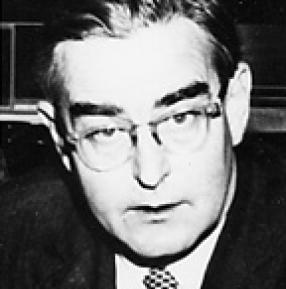James Vincent Cunningham (1911–1985) was an American poet, literary critic and teacher. He was born in Cumberland, Maryland in 1911. His father, James Joseph Cunningham, was a steam-shovel operator for a railroad who moved the family to Billings, Montana, and later to Denver, Colorado where Cunningham spent his youth. But the death of his father in an accident and the family’s resulting financial hardship prevented Cunningham from continuing immediately to college. He worked for a while as a “runner” for a brokerage house on the Denver Stock Exchange, where he personally witnessed two suicides in the days immediately following the October 29, 1929 stock market crash. (He talks about this in an interview with Timothy Steele.) Afterwards, there was, he would later remark, “a good deal of starving involved” as he tramped the West with his brother, looking for a job and writing ill-paying piecework for whatever publications he could find.
In 1931, he corresponded with Yvor Winters who offered him the opportunity to stay in a shed on his property and to attend classes at Stanford University where Winters was teaching. Cunningham earned an A.B. in classics in 1934 and a Ph.D. in English in 1945—both from Stanford. During World War II, he taught mathematics to Air Force pilots. He later earned his living primarily by teaching English and writing at various American universities. He took a position at Brandeis University in 1953, soon after the school was founded, and taught there until he retired in 1980.
Joseph Bottum has called Cunningham America’s best forgotten poet who “produced fewer than two hundred poems — several only two lines long — in a career of over fifty years, and although he lived through a number of poetic fads in America from the 1930s to the 1980s, he managed to remain unfashionable during them all. With a handful of what many professional critics and fellow poets acknowledge as nice minor verses, but without a single major poem identifiable by the greater poetry-reading public, he was little noticed, little anthologized, and little read… his work had suffered the invariable fate of minor poetry — as his last thin and incomplete volume of collected verse from a subsidized press slipped unnoticed out of print.”
In 1997, an important rerelease of Cunningham’s work, edited and with an introduction by poet Timothy Steele, entitled The Poems of J. V. Cunningham, revived his reputation and stirred new interest in his work. Reviewing that collection, Joseph Bottom concluded J. V. Cunningham “remains — in all that he did and all that he failed to do — the most fascinating poet of his generation.”
My Introduction to J. V. Cunningham
I first encountered the poetry of J. V. Cunningham in the 1970’s when a friend of mine in Dublin loaned me his copy of Collected Poems and Epigrams (Faber and Faber, 1971). I was smitten. Towards the end of that book was a section entitled A Century of Epigrams. To me, this was the “head” of the book, its amazing formal and witty intelligence. The “heart” of the book was a brief sequence of love poems entitled To What Strangers, What Welcome (1963). I must be among the few who contend that this is a neglected masterpiece, deserving of a much greater readership and attention. Subsequently I bought my own copy of the book and then, writing to publishers in the USA, bought The Collected Essays, The Journal of John Cardan and, eventually, the detailed annotated Timothy Steel edition of The Poems of J. V. Cunningham. I have not been disappointed. Some commentators, particularly David Barber and Joseph Bottum, would argue that Cunningham was restrained by his allegiance to the epigram. They have a point, but a very limited point. If you believe, as I do, that the epigram is a notable part of the history of English poetry then Cunningham is one of its greatest practitioners. I admit to finding his translations, some of which are included below, of a very limited value, but his own poems are ones I return to often. I hope you like them.
Brief Poems by J. V. Cunningham
Epigraph to The Helmsman
Of thirty years ten years I gave to rhyme
That this time should not pass: so passes time.
***
An Epitaph for Anyone
An old dissembler who lived out his lie
Lies here as if he did not fear to die.
***
Time heals not: it extends a sorrow’s scope
As goldsmiths gold, which we may wear like hope.
***
All hastens to its end. If life and love
Seem slow it is their ends we’re ignorant of.
***
Deep summer, and time pauses. Sorrow wastes
To a new sorrow. While time heals time hastes.
***
Motto for a sun dial
I who by day am function of the light
Am constant and invariant by night.
History of ideas
God is love. Then by conversion
Love is God, and sex conversion.
***
On the Calculus
From almost naught to almost all I flee,
And almost has almost confounded me,
Zero my limit, and infinity.
***
This Humanist whom no beliefs constrained
Grew so broad-minded he was scatter-brained.
***
This is my curse. Pompous, I pray
That you believe the things you say
And that you live them, day by day.
***
Death in this music dwells. I cease to be
In this attentive, taut passivity.
***
Epitaph for Someone or Other
Naked I came, naked I leave the scene,
And naked was my pastime in between.
Life flows to death as rivers to the sea,
And life is fresh and death is salt to me.
***
Here lies my wife. Eternal peace
Be to us both with her decease.
***
I married in my youth a wife.
She was my own, my very first.
She gave the best years of her life.
I hope nobody gets the worst.
***
You wonder why Drab sells her love for gold?
To have the means to buy it when she’s old.
***
Friend, on this scaffold Thomas More lies dead
Who would not cut the Body from the Head.
***
The Lights of Love
The ladies in my life, serially sexed,
Unscrew one lover and screw in the next.
***
They
Of all the gods that were
Remains one deity:
Who do they think they are?
They can’t do this to me.
Towards Tucson
In this attractive desolation,
A world’s debris framed by a fence,
Drink is my only medication
And loneliness is my defence.
***
Love’s Progress
Pal was her friend, her lover, and dismissed,
Became at last her lay psychiatrist.
***
An Oedipean Mom and Dad
Made Junior Freud feel pretty bad,
And when they died he was so vexed
He never after hetrosexed.
***
Portrait
I am the other woman, so much other
It is no task to tell the one from tother.
***
On a Letter
Unsigned, almost unsent, and all unsaid
Except the sending, which I take as read.
Brief Translations by J. V. Cunningham
Someone I tell you will remember us.
After the Greek of Sappho
***
The moon has set now, and
The Pleiades. It is
Midnight, the hours go by,
And I lie here alone.
After the Greek of Sappho
***
I hate and love her. If you ask me why
I don’t know, But I feel it and am torn.
After the Latin of Catullus
***
After Martial, 1.16
Some good, some middling, and some bad
You’ll find here. They are what I had.
After the Latin of Martial
***
1.32
Sabinus, I don’t like you. You know why?
Sabinus, I don’t like you. That is why.
After the Latin of Martial
***
4.33
You write, you tell me, for posterity.
May you be read, my friend, immediately.
After the Latin of Martial
***
4.69
You serve the best wines always, my dear sir,
And yet they say your wines are not so good.
They say you are four times a widower.
They say…A drink? I don’t believe I would.
After the Latin of Martial
***
On Raphael
This is that Raphael the Great Source of All
Feared as Its master, with his fall to fall.
After the Latin of Pietro Bembo
***
The Pope from penance purgatorial,
Freed some, but Martin Luther freed them all.
After the Latin of George Buchanan
LINKS
The complete text of J. V. Cunningham’s collection, The Exclusions of a Rhyme.
The Poetry Foundation page on J. V. Cunningham.
A 1983 interview with J. V. Cunningham by Timothy Steele.
AMERICA’S BEST FORGOTTEN POET A fascinating review of The Collected Poems by J Bottum in The Weekly Standard.
A review by David Barber of The Collected Poems in Parnassus Review
Louise Bogan and J. V. Cunningham read and discuss their poems.
Archival recordings of J. V. Cunningham, with an introduction to his life and work.
The late D. G. Myers shares his class notes of a J. V. Cunningham lecture.
Terse Elegy for J. V. Cunningham by X. J. Kennedy.

